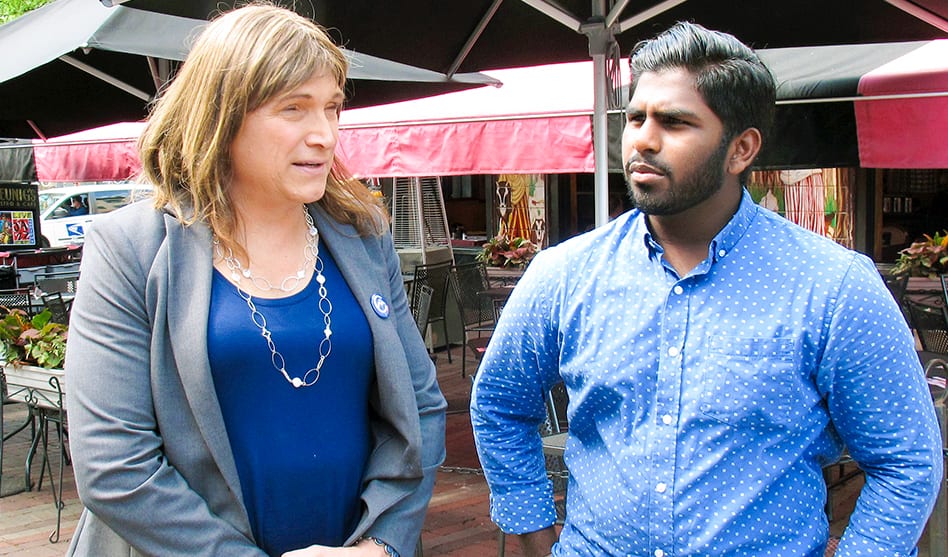Christine Hallquist, left, speaks with supporter Asfar Basha in Burlington, Vt., earlier this month during her campaign for the Democratic gubernatorial nomination. Hallquist made history Aug. 14 when she women the nomination. (Wilson Ring/Associated Press)
Report estimates 78,000 transgender citizens face voting barriers because of photo ID laws
James Russell | Contributing Writer
james.journo@gmail.com
Christine Hallquist of Vermont made history on Tuesday, Aug. 14, when she became her state’s Democratic gubernatorial nominee, and the country’s first major party transgender gubernatorial nominee. She faces Gov. Phil Scott, a Republican, in the general election.
Should the former electric company executive win in November, she would be the country’s trans governor and only the second openly-LGBT governor. (Oregon Gov. Kate Brown, a Democrat, is bisexual. She faces Republican Knute Buehler in the fall.)
While transgender and genderqueer voters may get out the vote this November in Oregon and Vermont, a new report suggests that an estimated 78,000 transgender people in states with strict voter identification laws may not have identification or documentation that accurately reflects their gender, according to a new report.
The Williams Institute report, co-authored by Jody L. Herman and Taylor N.T. Brown for the think tank based at University of California at Los Angeles’ Law School, does not explicitly mention Texas, which recently settled a multi year legal battle against its law, which was the strictest in the country when it passed in 2011. The report instead focuses on eight states, some of which are seen as battleground states in the fall. Those states are Alabama, Georgia, Indiana, Kansas, Mississippi, Tennessee, Virginia and Wisconsin.
In states with strict photo ID laws, government election officials and poll workers decide whether a voter’s identification accurately identifies the voter and matches the information listed in the voter registration rolls. These states have strict voter ID laws that require voters provide a government-issued photo ID, such as a driver’s license, U.S. passport or military ID, in order to vote at the polls.
In Texas, the law was tweaked last session to allow voters who are unable to provide one of seven forms of identification to sign an affidavit attesting they could not obtain proper identification, according to the New York Times.
In April, however, the conservative Fifth Circuit Court of Appeals in New Orleans upheld the state’s law in a 2-1 vote. The ruling was the first by a federal court to uphold the law, which plaintiffs argued discriminated against black and Hispanic voters.
“Transgender people who have transitioned often face substantial challenges to obtaining accurate identification,” Herman said in a press release. “Requirements for updating the name and gender on official IDs that could be used for voting vary widely by state and federal agency, and the process can be difficult and expensive.”
Transgender people of color, young adults, students, people with low incomes and people with disabilities are likely over-represented among the 78,000 eligible transgender voters who face barriers to voting and possible disenfranchisement in the November election.
“Strict voter ID laws could deny thousands of citizens who would otherwise be eligible to vote an opportunity to participate in the democratic process and have their voices heard at the ballot box,” said Herman. “Lawmakers, election officials and government agencies must work to ensure that transgender people have equal access to vote.”
The report relies on data from the 2017 Current Population Survey conducted by the U.S. Census Bureau and the Bureau of Labor Statistics and the 2015 U.S. Transgender Survey. According to the 2015 survey, conducted by the National Center for Transgender Equality, 46 percent of adult citizens who have transitioned reported that they had no identification documents or records that accurately reflect their gender, meaning their identifications have an incorrect gender marker, an incorrect name or both.
These voter ID laws, which passed following the 2010 Republican wave election that gave the GOP nearly complete control of state legislatures, are supposedly intended to protect electoral integrity and prevent voter fraud, according to their backers.
But a 2017 study published in the scholarly Journal of Politics revealed that they “have a differentially negative impact on the turnout of racial and ethnic minorities in primaries and general elections.”
They also benefit conservatives, according to authors Zoltan Hajnal and Nazita Lajevardi of the University of California at San Diego and Lindsay Nielson of Bucknell University. They note that the strict laws “skew democracy toward those on the political right.”
The laws also come with strict punishments, as two local women learned. Crystal Mason of Rendon, just south of Fort Worth, earlier this year was sentenced to five years in jail for voting in the 2016 presidential election while on probation. Mason, who is black, voted with a provisional ballot.
Last year, Rosa Maria Ortega of Grand Prairie, who is in the country with a green card, was sentenced for illegally voting in the 2012 general election and 2014 Republican run-off. (She voted for Attorney General Ken Paxton, she said, who has joined other Texas elected officials in the charge against voter fraud.)
Recently, two Republican former justices of the peace got relatively light sentences for similar infractions.
In Tarrant County, former JP Russ Casey resigned from office after being found guilty of falsifying signatures on his re-election petition. He only received probation.
Just last month, former JP Brian Hutcheson of Garland was removed from the ballot for similar reasons. And earlier this month, Dallas County Republicans voted Hutcheson to replace their nominee for county judge, former Rowlett Mayor Todd Gottel.
Hutcheson, a straight, cisgender male, who has campaigned as an advocate for conservative Christian values and holds anti-LGBT positions, faces Dallas County Judge Clay Jenkins in the fall.













